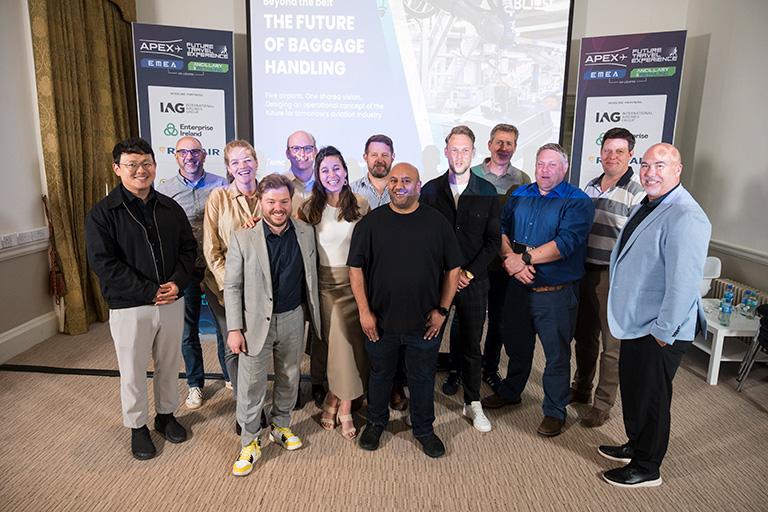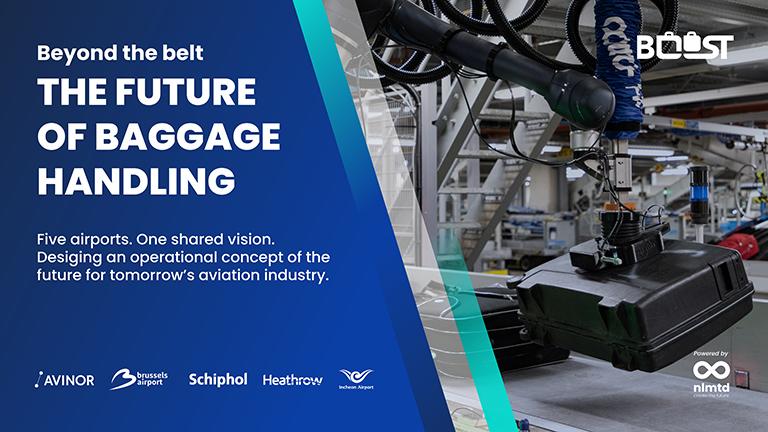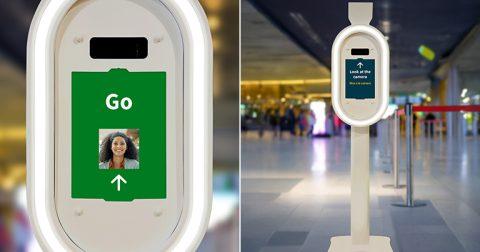
Five leading international airports – Amsterdam Airport Schiphol, Avinor, Brussels Airport, Heathrow, and Incheon International Airport – have joined forces under the BOOST collaboration to publish a landmark white paper redefining the future of baggage handling. Powered by innovation consultancy nlmtd, the BOOST White Paper sets out a shared vision to tackle longstanding challenges in baggage operations and fast-track a smarter, safer, and more sustainable future for the aviation industry. The BOOST initiative spun out of the FTE Baggage Innovation Working Group and aims to eliminate physical strain and improve working conditions for baggage workers by rapidly adopting advanced technologies.
The BOOST White Paper introduces a collective vision to transform baggage handling into a model of efficiency, innovation, and global partnership. While each airport faces unique challenges, the white paper identifies four core bottlenecks within the current process – including high physical strain on workers, fragmented operational ownership, manually planned processes, and outdated flight-oriented workflows. Instead of addressing these pain points in isolation, the BOOST initiative embraces joint innovation to deliver scalable, sustainable change.
An orchestrated, digitally enabled ecosystem
Central to the white paper is the recognition that baggage handling must evolve from a siloed, labour-intensive function into an orchestrated, digitally enabled ecosystem. BOOST proposes a move away from today’s flight-based operations and toward a more agile, load unit-oriented model, where baggage is grouped into intelligent containers that move independently of flight schedules. This approach unlocks earlier processing, more buffer flexibility, and reduced mishandling – delivering benefits across performance, safety, and passenger experience.
The physical nature of baggage work is also being addressed head-on. Automation and robotics are positioned not as optional enhancements, but as essential enablers of the future process. The white paper outlines how new technologies – from automated guided vehicles (AGVs) to robotic loading cells – will eliminate much of the heavy lifting, while reshaping the role of the baggage handler into that of a digital orchestrator. Staff will manage exceptions, monitor system flows, and make data-informed decisions, supported by real-time tools rather than manual guesswork.
To ensure this transformation is grounded in real-world viability, BOOST airports have already launched a series of proof-of-concept pilots. These experiments explore elements such as automated unloading, baggage flow simulations, orchestration software development, and the use of Airport Load Devices (ALDs) in place of traditional baggage carts. Importantly, the results of these pilots are being shared transparently between participants – an approach that reinforces the collaborative spirit at the heart of BOOST.

The 3P framework – a holistic approach
The white paper also presents a comprehensive framework for evaluating these innovations through three lenses: People, Product, and Process. This ‘3P model’ ensures that technical progress is matched by improvements in workforce wellbeing and end-to-end flow design, and enables airports and stakeholders to prioritise performance that benefits workers and passengers alike.
Industry call to action – accelerating baggage transformation together
As the industry grapples with rising costs, labour shortages, and pressure to modernise, the BOOST White Paper marks a decisive call to action. The group is inviting airlines, handlers, suppliers, and fellow airports to join the movement, contribute insights, and help scale what works.
“Our drive is toward achieving industry collaboration. I believe airports should lead the way – by sharing a clear vision for the future while accelerating real change today. That way, we learn, adapt, and innovate to shorten the transition period,” said Dennis van Kleef, Programme Lead Baggage, Amsterdam Airport Schiphol.
The BOOST initiative is built on open pilots, cross-airport taskforces, and future-focused outputs, including tools, blueprints, and ongoing thought leadership. It is a clear signal that the time for incremental change is over – and the path to next-generation baggage handling will be forged together.
To explore the white paper and find out how to get involved, visit: www.boostbaggage.com
Learn more about the FTE Baggage Innovation Working Group and how to participate >>You may also be interested in
12 technology and CX trends that can enhance airline and airport operations in 2025







